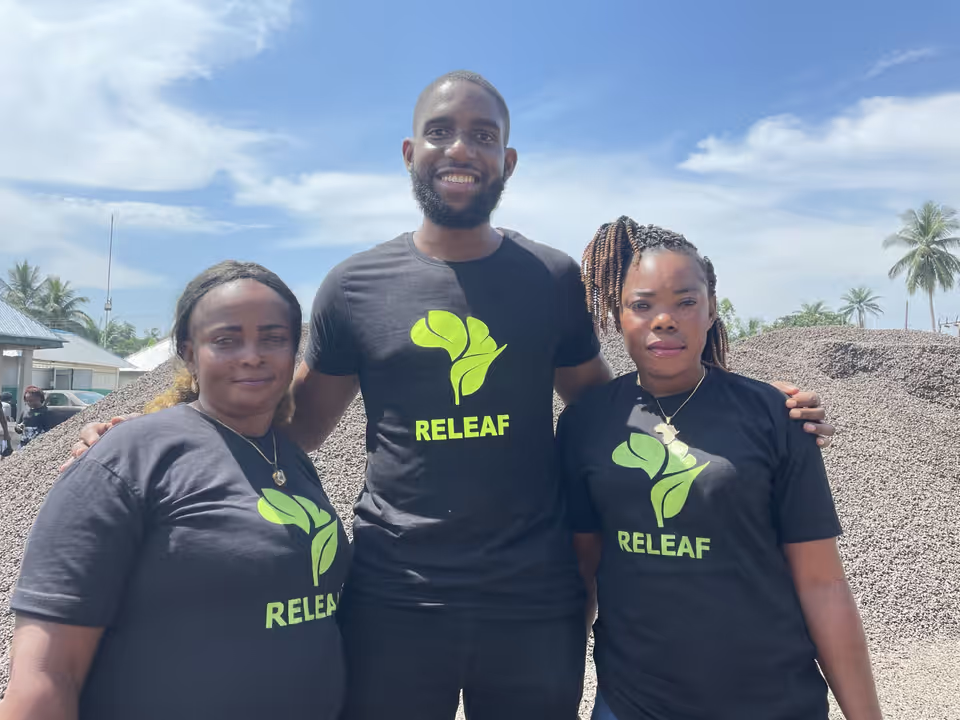Nigerian Agritech startup, Releaf has secured $4.2 million in seed funding and grants to drive the industrialization of food processing for Africa which will also enable Nigeria’s Oil Palm sector.
Co-founded by Ikenna Nzewi and Uzoma Ayogu, Releaf develops proprietary hardware and software solutions that make African farmers and food factories more efficient and profitable raised $2.7 million in seed funding in a round led by Samurai Incubate Africa, Future Africa and Consonance Investment Managers with participation from Stephen Pagliuca, Chairman of Bain Capital and Justin Kan (Twitch).
Aside from the seed funding, Releaf received $1.5 million in grants from The Challenge Fund for Youth Employment (CFYE) and USAID.
Through the seed funding, Releaf will enable the development of industrial food processing technology in Nigeria’s smallholder-driven Oil Palm sector while the grant will enable Releaf to provide working capital and other value-added services for smallholders and small-scale processors. Meanwhile, the grant funding will support the training, recruitment and retention of more women and youth in the Nigeria Oil Palm sector through the creation of both digital and technical jobs.
According to reports, Nigeria’s oil palm industry is dominated by smallholder farmers, with 80% of the local market share. The United States Department of Agriculture (USDA) said Nigeria is the fifth-largest palm oil-producing country, with 1.5% or 1.03 million metric tonnes of the world’s total output.
Meanwhile, Releaf’s software connects the start-up to more than 2,000 smallholder farmers, ensuring consistent, large-scale supply thereby acting as a bridge between smallholder farmers and food manufacturing companies with its proprietary patent-pending machinery, Kraken. Kraken can process any quality of palm nut into premium quality (95 % purity) inputs for food factories.
While palm kernel oil production is not foreign to Nigeria, Releaf’s technology and scale mean it can process 500 tones of palm nuts per week. The software offerings also allow the start-up to receive inbound supply requests from farmers via USSD, provide working capital financing as well as collect proprietary data on supply availability.
According to the CEO and co-founder of Releaf, Ikenna Nzewi, said, “our mandate is to industrialize Africa’s food processing industry. This round of funding enables us to develop and prove our technology with smallholder farmers in the oil palm sector. Given Nigerians spend 60%of their income on food and Africa’s population is set to increase by 100,000 people per day over the next three decades, we’re presented with an incredible opportunity to feed more people, reduce consumer costs, and supply the fastest-growing food market in the world.
Releaf is committed to harnessing technology to accelerate the economic wealth of rural, agrarian societies throughout the Continent. We firmly believe that a robust real economy is the foundation for long-lasting and shared prosperity for Africans and are excited to deepen partnerships with like-minded organizations, governments, and firms.
This new funding will enable better productivity and accelerate the eradication of the menial and archaic processes that are prevalent across Nigeria’s oil palm sector and the agriculture sector as a whole. It will also enable Releaf to drive more value and profitability across the oil palm value chain, as well as support direct and ancillary job creation in the farming communities of South and Eastern Nigeria.
Rena Yoneyama, Managing Partner at Samurai Incubate Africa who led the round said, ‘Releaf’s novel approach to operating within the value chain with proprietary technology set it aside from many agritech startups we have spoken to. We believe the firm’s thesis on decentralizing food processing would have a strong match with Africa’s economic development landscape for the next few decades.
Rena believes that Releaf will disrupt the target market in Nigeria and beyond.
In a separate remark, Iyin Aboyeji, General Partner at Future.Africa noted that more than 50% of the goods in supermarkets globally contain glycerine – an extract made from palm oil – a cash crop that is passed down from generation to generation.
He further expressed his delight in backing Releaf to build the future of modern agriculture. According to him, ‘the team at Releaf is building the agro-allied industry of the future from the ground up starting with palm oil which they have developed a novel technology to aggregate, deshell and process into critical ingredients like vegetable oil and glycerin.’
Meanwhile, the Country Relationship Manager of The Challenge Fund for Youth Employment (CFYE), Dr. Nneka Enwonwu, said they are looking forward to the results and success of the beneficiary of the grant over the coming years. Nneka said that with the team’s enthusiasm, Releaf will deliver real value for rural communities and create digital/technical jobs for women and youth.
Recall that, in November 2020, benjamindada.com reported that, Releaf received $20,000 as the winner of the early startups’ category at the African Development Bank’s (AfDB) AgriPitch competition
Get passive updates on African tech & startups
View and choose the stories to interact with on our WhatsApp Channel
Explore




